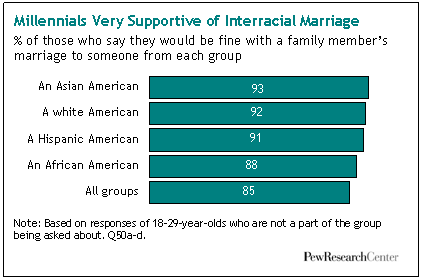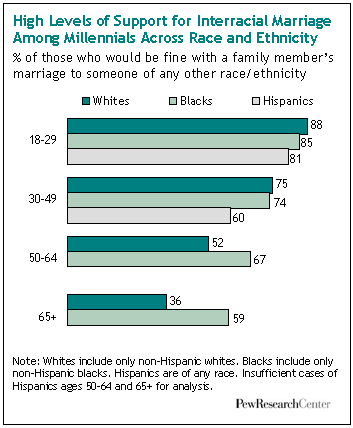
This is part of a Pew Research Center series of reports exploring the behaviors, values and opinions of the teens and twenty-somethings that make up the Millennial Generation
Over the last several decades, the American public has grown increasingly accepting of interracial dating and marriage. This shift in opinion has been driven both by attitude change among individuals generally and by the fact that over the period, successive generations have reached adulthood with more racially liberal views than earlier generations. Millennials are no exception to this trend: Large majorities of 18-to-29 year olds express support for interracial marriage within their families, and the level of acceptance in this generation is greater than in other generations.
The Pew Research Center’s recent report on racial attitudes in the U.S., finds that an overwhelming majority of Millennials, regardless of race, say they would be fine with a family member’s marriage to someone of a different racial or ethnic group. Asked about particular groups to which they do not belong, Millennials are about equally accepting of marriage to someone in any of the groups tested: Roughly nine-in-ten say they would be fine with a family member’s marriage to an African American (88%), a Hispanic American (91%), an Asian American (93%) or a white American (92%).

This high level of acceptance among Millennials holds true across ethnic and racial groups; there is no significant difference between white, black and Hispanic Millennials in the degree of acceptance of interracial marriage.

Compared with older groups, particularly Americans ages 50 or older, Millennials are significantly more likely to be accepting of interracial marriage. While 85% of Millennials say they would be fine with a marriage to someone from any of the groups asked about, that number drops to about three-quarters (73%) among 30-to-49-year-olds, 55% among 50-to-64-year-olds, and just 38% of those ages 65 and older. And unlike among Millennials, among those ages 50 and older there are substantial differences between blacks and whites in acceptance of interracial marriage, with older blacks considerably more accepting of interracial marriage than are whites of the same age.
The gap between Millennials and other age groups is evident for all of the individual groups asked about, though the size of the gap does vary as Americans ages 50 to 64 and 65 and older are less likely to accept marriages to members of some groups (in particular, African Americans) than others (in particular, white Americans).
Other demographic characteristics also are correlated with attitudes towards interracial marriage. Both overall and within each generation, acceptance of interracial marriage is positively associated with being female and with higher levels of education. And among older generations, those who can count at least some members of other races as friends and those who live outside of the South are also more accepting of interracial marriage.
Shift in Public Attitudes over Time

Not surprisingly, given the high levels of acceptance of interracial marriage among Millennials, nearly all 18-to-29-year-olds (93%) agree with the statement “I think it is all right for blacks and whites to date each other.” Pew Research has tracked responses to this question for more than two decades in its study of American political values, most recently in April 2009. These surveys have found Millennials very accepting of interracial dating since the opinions of this generation first were tracked in 2003 (in 2003, 92% of Millennials agreed that it was all right for blacks and whites to date).
When the first Generation Xers began to be tracked in the late 1980s, about two-thirds of this generation (those born between 1965 and 1980) agreed that it was “all right for blacks and whites to date each other.” By the time all members of that generation had reached age 18, fully 85% agreed with the statement — about the same proportion as does so today (86%). The opinions of Baby Boomers (those born between 1946 and 1964) became more accepting of black-white dating in the early 1990s and have steadily become more so; in recent years, Boomers have become almost as accepting of interracial dating as Gen Xers. The oldest generation currently being tracked, the “Silent” generation (those born between 1928 and 1946), has steadily become more racially liberal over time, though they remain significantly less likely to approve of interracial dating than are those in younger generations (68% in 2009).
Younger Generations More Likely to Have Friends of a Different Race

In addition to their racially liberal views on marriage and dating, a majority of Millennials (54%) in Pew Research’s report on race say at least some of their friends are of a different race. The percentage of white Millennials saying they have black friends (56%) is about the same as the percentage of black Millennials who say they have white friends (55%). There is little difference on this question between Millennials and Americans ages 30 to 49. But Americans ages 50 and older are considerably less likely to have cross-racial friendships, and this difference is largely the result of fewer older whites having black friends. Just 36% of whites ages 50 to 64 and 32% of whites ages 65 and older report having at least some black friends. There are no statistically significant differences between older and younger blacks in reports of cross-racial friendships.
For more on the American public’s attitudes about race, including more detailed analysis of attitudes towards interracial marriage, see A Year After Obama’s Election Blacks Upbeat about Black Progress, Prospects. For more on values, see Independents Take Center Stage in Obama Era.




